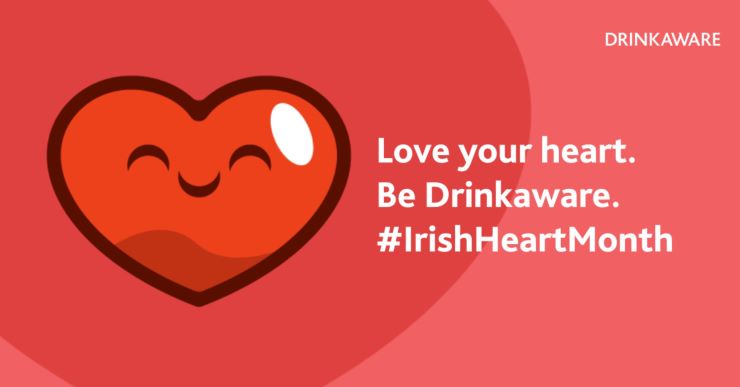In 2018, almost 3 in 10 deaths in Ireland were caused by heart disease and stroke according to the Central Statistics Office. The 2019 Pfizer Health Index found that 40% of Irish adults are concerned about developing heart disease in the future, while high blood pressure and high cholesterol are among the top three health conditions reported.
The Irish Heart Foundation advises that 80% of heart disease and stroke is preventable through lifestyle changes, including drinking less or cutting out alcohol. September is Irish Heart Month – a great time to think about your drinking habits and see if it might be time to make a change.
WHAT’S THE ISSUE WITH ALCOHOL?
We have all read media articles about research claiming the health benefits of moderate drinking however, a growing number of recent studies concluded that any beneficial effects against heart disease were cancelled out by the combined health risks associated with alcohol.
Regularly drinking over the low-risk guidelines raises your blood pressure, which means your heart has to work harder to pump blood around the body. High blood pressure can also affect how quickly a heart beats (arrhythmia) and can cause the heart muscles to weaken (cardiomyopathy). High blood pressure is one of the most common alcohol-related health problems facing Irish adults, but many people don’t realise they have it. In fact, it is often referred to as a ‘silent killer’ and by 2020, it is estimated that 1.2 million adults in Ireland – one-quarter of the population – will have high blood pressure.
Did you know? If you are overweight or obese, you are more likely to have a heart attack than a person who is a healthy weight. Alcohol has a high calorie content but what many people don’t realise is that alcohol can also contain a lot of sugar, which can contribute to weight gain.
Order our free Get the Facts pack for a calorie and sugar calculator
KNOW THE GUIDELINES
The Drinkaware Index 2019 report revealed that just 2% of Irish adults can correctly identify the HSE low-risk weekly alcohol guidelines. Tracking how much alcohol you’re drinking and sticking to the guidelines is an easy way to practise mindful drinking habits:
- Women: Less than 11 standard drinks (110g pure alcohol) spread out over the week, with at least two alcohol-free days
- Men: Less than 17 standard drinks (170g pure alcohol) spread out over the week, with at least two alcohol-free days
Common examples of one standard drink are a half pint of lager/stout/cider, a 100ml glass of wine or pub measure (35.5ml) of spirits.
Try our Drinks Calculator to see if you are drinking within the guidelines
MAKE SMALL CHANGES
Here are some small steps you could take to drink less alcohol. Remember, everyone’s motivation for drinking less is different so it’s important to choose what will work for you.
- Stay out of rounds – you may end up drinking far more than you intended as you are more likely to drink at the pace of the fastest person in the group.
- Set yourself a limit on a night out. If you usually go for an after-work drink on a Friday, why not set a limit on the number of drinks you will have in advance? Keeping this number in mind will help you to keep track and stick to it.
- Alternate each drink with a glass of water to reduce the dehydration associated with alcohol. Keep a jug of water on the table to make this easier.
- Always use a measure for spirits and wine instead of free pouring. Order one for free
- Never top up your wine glass – always finish one glass before refilling. Topping up your glass makes it harder to track how much you’re drinking.
- Take advantage of the increasingly available low- or no-alcohol beer and wine and swap out your usual drink.
- Break your habits at home. This can seem like a nice way to unwind after a long day but it can often result in drinking more than usual. If your normal night in includes a drink in front of the TV, consider doing something different like going for a walk or try not to keep alcohol in the house.
- If you would like to stop drinking completely, we have some advice to help.


